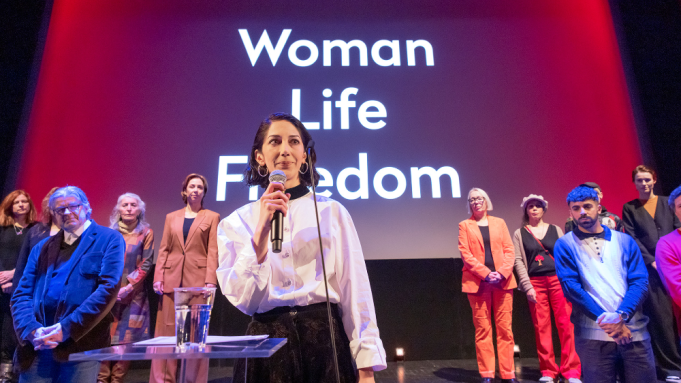GÖTEBORG, Sweden — Many of the screenings at this year’s Göteborg International Film Festival have been preceded by a talk or introduction.
But none, so far, have witnessed a dignified protest. That all changed on Tuesday when audiences at the city’s Grand Theatre watched a 30-minute on-stage protest by Iranian actor and Nordic Competition jury head Zar Amir Ebrahimi (“Holy Spider”).
Amir Ebrahimi dedicated the protest to the Iranian people and the jailed artists of Iran. Joining her on stage were fellow jury members Sofie Gråbøl, Nahid Persson and Gizem Erdogan, as well as Swedish-Iranian filmmakers and Jonas Holmberg, artistic director of the Göteborg Film Festival.
Following a speech critical of the Iranian regime and of the crackdown that has so far led to more than 500 deaths, she then read out the names of 173 jailed artists and cultural figures whose names were displayed on a screen on the stage.
Prior to the screening of the Iranian film “Subtraction” by Mani Haghighi, Amir Ebrahimi read a statement written by a group of artists, writers, and cultural practitioners called Art Culture Action Association.
During her speech, Amir Ebrahimi urged the spectators to sign the statement written by Art Culture Action Association. The statement calls for support and solidarity for the people of Iran and against the oppression being practiced by the regime. You find the statement here.

Zar Amir Ebrahimi at Göteborg Film Festival
“We, artists, writers, academics, and cultural practitioners from across disciplines and various countries, support the call of our Iranian colleagues to stand in solidarity with their struggle against the repressive and despotic Islamic state in Iran,” the statement runs. “We, the undersigned, unreservedly acknowledge and support the courage of all the women, men, and children of Iran in their fight for fundamental human rights and their clearly expressed desire to renew the nation’s social contract,” said Amir Ebrahimi during her speech.
Since the beginning of the revolutionary movement, 173 artists, filmmakers and art students have been tortured, jailed or are out on bail according to a list published by Art Culture Action Association.
“We demand their immediate and unconditional release, cancellation of unjust and group sentences, abolition of the death penalty, and investigation by international institutions of torture and murders committed in prisons,” she said.
She added: “We are demanding an immediate end to all threats, detentions and killings… Iranians of all walks of life have shown bravery and determination in standing against state brutality over the past 137 days, since the killing of a 22-year-old woman at the hands of the Islamic State.”
She added: “Decades of systematic human rights violations have now turned into the Woman, Life, Freedom movement demanding the end of the theocratic rule by an unelected Clerical government.”
“We artists, academics, writers and cultural practitioners from across the world, have decided to stand in solidarity with our colleagues and their struggle in Iran.”
“We air our grave concern, not only for artists and students but for citizens across Iran, facing an increasingly violent and brutal state crackdown, involving kidnapping, disappearances and multiple forms of sexual, physical and violent abuse involving torture and open threats of mass executions.”
“We recognize that this terror is not an isolated event, but that over the past 44 years, the Islamic State has resorted to all manner of social and cultural injustice. With the oppression of ethnic, social and sexual minorities, as well as xenophobia and misogyny.”
Haghighi then spoke to the audience via a pre-recorded message video-d in his home in Iran, as the government prevented him, he said, from traveling to the festival.
In his film “Subtraction,” which played following the peaceful protest, Iranian star Taraneh Alidoosti (“The Salesman”) leads a dystopian thriller, set in Iran, where a married couple thinks they’ve found their doppelgängers in the pouring rain in Tehran. Alidoosti was put in prison in December for protesting against the violence against critics of the regime.
“I’m speaking to you from here because I’m home bound in Iran,” said Haghighi. ”There’s not too much I can say without giving the film away.”









